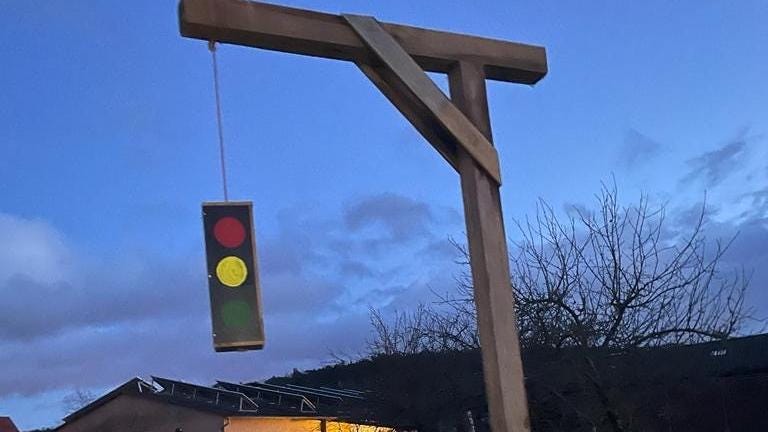Days of government-sponsored protests and state media campaigns against the AfD have failed to break support for the party, and still less to solve any of Germany's problems

In Soviet Germany, the government protests YOU.
Alas, government-organised and state media-promoted protests are a great expense and they cannot go on forever. Yesterday Der Spiegel could still write that “tens of thousands are protesting against the AfD,” but even the inflated numbers they provided – 17,000 in Darmstadt! 5,000 in Heilbronn! 4,000 in Rottenburg! 2,500 in Schwerin! 1,500 in Greifswald! – were notably smaller than the massive actions reported days earlier in places like Hamburg and Munich. And today all is quiet, thanks in no small part to the rail strike, which makes it hard to pack the streets by shipping in extras from out of town.
The media want us to believe that all of this has really hurt the opposition, but the numbers belie the headlines. An INSA survey published on Monday has the AfD polling at 21.5% Germany-wide, which Welt hails as “the biggest decline in almost two years.” That is not really true,1 and anyway the AfD were polling even lower in November 2023, before the whole false Correctiv controversy ever began. It is a similar story with the latest Forsa survey published yesterday, which has AfD down two points to where they were last October. The press can wildly inflate ridiculously dishonest stories, the government and their affiliates can call for nationwide demonstrations against “the right,” and they can mobilise hundreds of thousands of their supporters, but all they get for their trouble are a few measly percentage points hardly beyond the error margin.
One way our establishment schoolmarms probably could hurt the AfD, is if they stopped delivering us tiresome lectures about the wrongness of our political preferences. Nothing makes me want to put the opposition in power more than reading the deluge of commentary about why it is a grave sin to want the Scholz Clown Car out of government. You could not devise a better pro-AfD guerilla publicity campaign if you tried.
Last weekend Spiegel journalist Susanne Beyer posted one of the most absolutely grating pieces in this genre. “Germany is actually well-governed,” it declares to the 82% of citizens who take a different view:
Praising and defending the government is not really what you’re supposed to do in my job. But I’m going to do it anyway.
Firstly, because this is a free-form column… And secondly, because although critical distance is the basis of my profession, that also entails scrutinising widespread views.
These days, you hear almost nothing but criticism of the government. On the streets it’s very loud. There are strikes, protests. Last weekend, the Federal President criticised the coalition in an interview in the Süddeutsche Zeitung, while the Federal Chancellor criticised himself in a video message that same weekend.
This winter will be remembered as a “winter of rage.”2 One particular image will also be remembered: the gallows held up at demonstrations. The gallows are intended for politicians of the coalition.
Here is one of the gallows Beyer is talking about:
The traffic light is of course a symbol for the government, and the media have had the vapours about displays like this for weeks now. In fact such gallows are not very widespread, but they are also a metaphor. I cannot believe I have to explain this. The people who set up these displays are not literally demanding that Scholz, Habeck and Lindner be hanged. They want them to resign.
Beyer writes that she first became “uneasy” when CDU chief Friedrich Merz and BILD called for new elections in December. This is because Beyer knows that new elections would most likely bring the CDU into government and Beyer does not like the CDU. That a great many people disagree with her doesn’t matter; Beyer’s opinion is more important than yours, because she is a Spiegel journalist. Also, new elections would be good for the AfD, and the very thought of this makes Beyer angry:
What really outrages me about the calls for new elections is the flippancy with which they are being made in view of the AfD’s high poll ratings. New elections now? For what purpose? To wilfully dismantle democracy?
Yes, nothing portends “dismantling democracy” as much as holding free and democratic elections at a moment when too many people have the wrong opinions. What we should probably do is suspend elections, until everybody comes around to Beyer’s way of thinking. That will surely happen sooner or later.
Because our columnist probably last went outside in 2019, she can’t imagine why the Scholz government is so unpopular:
According to a study by the Bertelsmann Foundation, the coalition government has either already implemented (38%) or started to implement (26%) almost two-thirds …of what it calls its “ambitious coalition agreement.”
Yet only a small proportion of Germans know this. “The public fighting within the coalition has led to an underestimation of the government’s true performance and their commitment to implementing [their programme]," the Foundation says.
This means … that the poor public mood has less to do with facts than with perception that has been clouded partly by the coalition and their squabbles.
Contrary to the contentions of Beyer’s favourite globaloid NGO, people are not mad at the coalition because of their in-fighting. They are mad at them because the economy is on life support, their heating and energy bills are outrageous, and every day they have to hear empty-headed head girls like Beyer tell them how great all this is.
And then there is this: Social democrats and Greens do not appeal to voters with their precise policies, but rather because their slogans sound good. Their supporters think they’re voting to do things like save the planet and give poor people more money. The problem arises when the Greens and the social democrats actually follow through on their promises, and the electorate faces nothing but economic stagnation and rising tax burdens as far as the eye can see. The coalition would be polling far better if they’d ignored their “ambitious coalition agreement” and done as little as possible.
Beyer continues to catalogue the successes of the Scholz circus troupe. They “coped well with the energy crisis” by allowing our allies to blow up Nord Stream with nary a complaint and investing in wildly expensive American liquid natural gas and turning off our last nuclear plants only to import even more nuclear power from France.3 Also too they have “expanded renewables” and they’ve raised the minimum wage; “what’s wrong with that?”4 Finally our paragon of political wisdom gets to the heating ordinances. These “continue to infuriate many voters,” but “Banning oil and gas heating systems in new buildings is the right thing to do.” That is only part of what the heating ordinances prescribe, but okay.
Beyer concludes her magisterial defence of the unprecedented losers who lead us with odd philosophical musings that “The state is not just a government.” Rather it is “a multi-layered structure” with “a great many institutions and people.” When things go wrong (but I thought everything was going great?) it’s not right to lay it at the feet of politicians because it’s probably somebody else’s fault:
This brings us back to journalism. We journalists like to visualise abstract processes with the help of concrete figures. … We have to be careful that this specific focus on individuals and their conflicts and other negative things doesn’t create a reality that we’ll then have to criticise.
We just need to stop writing negative stories about how bad things are! We need to write happy stories about our politicians and everything will be fine! Then we’ll “create a reality” that won’t require negative commentary and all will be fine!
Our entire establishment appear actually to believe this; it is why the coalition and their supporters are constantly insisting that their failures amount to mere problems with “communication.” As long as they remain committed to their blindness, the AfD will continue to gather support, however many people Scholz calls to the streets to denounce “the right.” Once again: If the government don’t like being universally reviled and they want their political opponents to be less popular, perhaps they should govern better.
An earlier Forsa survey, conducted mostly before the massive protests, had AfD at 22%, so strictly speaking we’re talking about a decline of 0.5 percentage points.
Hahahahahhahaahahahhahahahhahhhahahahahahaha.
In fact she only mentions the liquid natural gas part, the rest is my editorial addition.
A lot is wrong with that; to begin with, it drives jobs out of Germany.




This is truly a remarkable time. Doomsters may lament that, like frogs in slowly-heated water, the populace will gradually acclimate to lower standards of living and diminishing freedoms until it's too late to mount an opposition. What we are seeing instead is that, at a very organic and personal level, resistance is mounting. It may be true that most people will not put up a fight until their heels are at the edge of the cliff, but we are reaching the point at which the choice of fight-vs.-tumble-into-the-abyss is starkly before us. If this sentiment were confined to only one or two jurisidictions, these pockets of resistance would not hold--but peoples across the West are finally being pushed to the breaking point. This is only the beginning of a very tense year, but there is hope.
The AfD support is spiking up in an organic manner precisely because Germany is Imploding.
Deindustrialization is the natural result of decoupling from Russia & the rest of Eurasia.
The People will eventually revolt to stop living standards from cratering.
The US occupation of Germany (& Europe) will end!
The Populist Triumph in Germany is inevitable!